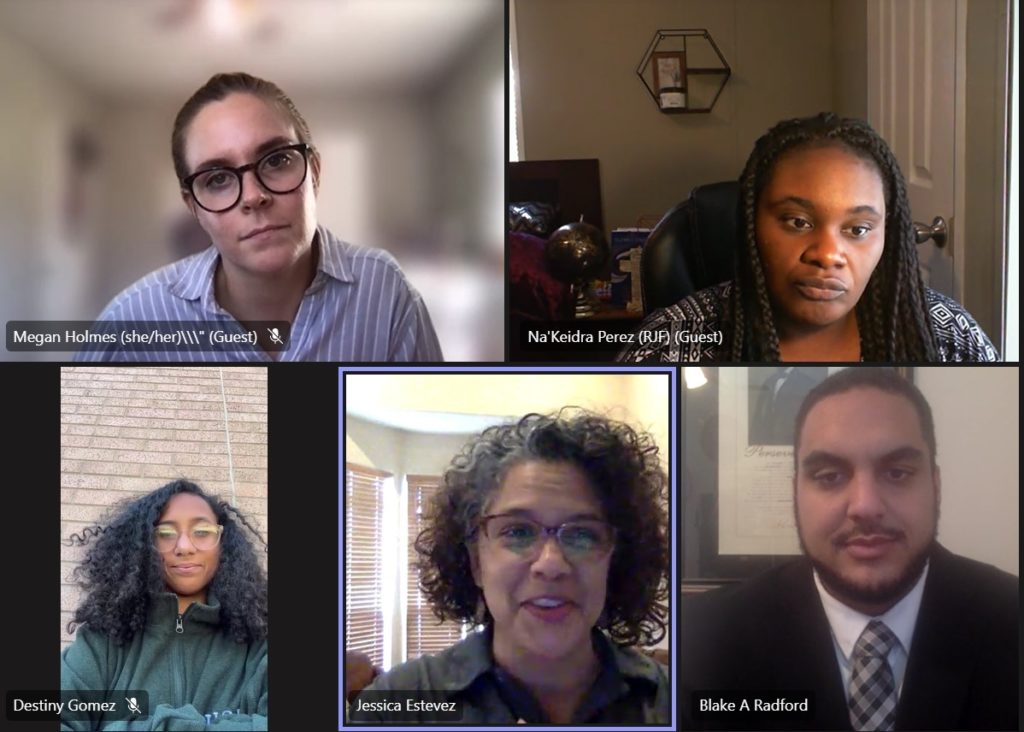Racial Justice Student Fellows Explore the “New Normal” of Post-2020 Life
Just like the pandemic, the struggle for racial justice hasn’t ended – but it’s evolved in ways nobody expected. Information – and misinformation, much of it harmful and divisive – spreads rapidly as many communities are struggling.
A panel of Racial Justice Student Fellows from Pinellas County higher-learning institutions including Stetson Law examined how to promote racial healing and a greater sense of unity in a virtual talk called “Truth Talk: Creating a New Normal.” The event was part of an ongoing series of conversations organized by St. Pete/Pinellas Higher Education for Race Equity (SPHERE), a consortium formed in 2020.
Panelists sought to uncover new ways to foster a culture on campus that acknowledges the struggles and inequities that have challenged Black students well before Covid-19 and the 2020 uprisings.
“We think this conversation is important,” said DeWayne Anderson, assistant program director for the Office of Multicultural Affairs at University of South Florida’s St. Petersburg campus. “We think racial healing is important.”
The Ripple Effects of 2020
Stetson Law student and SPHERE fellow Blake Radford moderated the panel. He kicked it off by asking the panelists to reflect on the year 2020, and whether racial injustice intensified.
“I do think that it was kind of revealed and it grew to a fever pitch,” said Stetson Law student Megan Holmes, the other SPHERE fellow from Stetson Law. “Everyone had to pay attention because there was nothing else to do. Because they were at home and their attention was available.”
From that grew conversations about inequities in everyday life, and questions about whether society is truly inclusive. Panelist Na’Keidra Perez, a SPHERE fellow who left the corporate world to attend St. Petersburg College, said it can go as far as one’s identity in professional settings.
“I still can’t go by Na’Keidra at work,” she said, adding that she’s had to go by “Nikki” in corporate settings. “Let alone share my pronouns, I can’t even share my name.”
Healing Through Difficult Conversations
Part of racial healing, she said, is to have open conversations about why the dominant culture isn’t inclusive despite the diversity that constitutes it – and be open to putting in the hard work to change it, regardless of your racial identity.
“Learn how to become an imperfect ally. You may not look like me, but you have a problem that I can help with,” she said. “To me, racial healing is a painful process at which we are [to paraphrase Dr. Martin Luther King, Jr.] continually moving toward the promised land.”
SPHERE is a collaborative undertaking comprising Eckerd College, the Foundation for a Healthy St. Petersburg, St. Petersburg College, Stetson University College of Law, and USF St. Petersburg. The consortium originated in 2020 as a means of confronting inequalities that exist in Pinellas County. These higher-education institutions serve more than 40,000 students, collectively.
Each year, the consortium selects two fellows from each campus to participate in frequent conversations activities that give them an active role in shaping policies that support systemic change and racial healing. The 2021-2022 Racial Justice Student Fellows were the inaugural students to participate in the program.
Learn more about the St. Pete/Pinellas Higher Education for Racial Equality consortium student fellowship program. If you are interested in becoming a SPHERE racial justice fellow in the 2022-23 academic year, please contact Professor Judith Scully.
Post date: Feb. 11, 2022
Media contact: Kate Bradshaw
[email protected] | 727-430-1580
